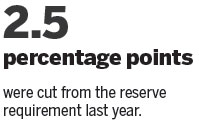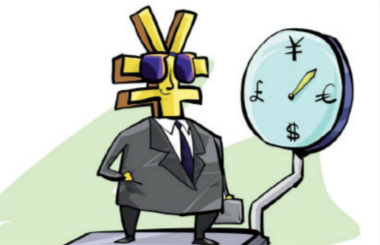Central bank expected to further cut reserve ratio
Updated: 2016-02-03 08:17
By Zheng Yangpeng(China Daily)
|
|||||||||||
China should be ready for more cuts in the reserve requirement in the next few years, in a bid to prevent the economy falling into a downward spiral, a government think tank said on Tuesday.
A report by the Institute of Finance and Banking under the Chinese Academy of Social Sciences said lowering the minimum portion of deposits banks are required to set aside will become "a new normal" in the next few years as the central bank frees up more liquidity to spur growth.
The lowering of the ratio is also imperative to offset the decrease in liquidity of the yuan caused by foreign currency purchases, which was estimated to be 708.2 billion yuan ($109 billion) in December.
The People's Bank of China, the central bank, last year lowered the reserve requirement four times, or a combined 2.5 percentage points. Large financial institutions still have to set aside 17.5 percent of their deposits as reserve.
Since October, when the last cut occurred, the People's Bank of China held off further cuts over fear of the yuan's devaluation.

Instead, the bank has adopted other means, such as open market operations, to inject 862.5 billion yuan of liquidity into the market.
Other financial institutions have predicted that the People's Bank of China will cut the ratio by 0.5 percentage points two to four times.
Responding to concern over its possible impact on the value of the yuan, Guo Tianyong, head of the China Banking Research Center at the Central University of Finance and Economics, said: "You can't have an independent monetary policy, free capital flow and a stable exchange rate at the same time. If monetary easing is imperative for China's economy, then something else might have to give."
At the symposium launching the report, financial experts said they are concerned that the much-touted supply-side reform may not be sufficient to address China's near-term woes. Monetary easing, as well as other policies targeting demand, could send a positive signal to investors, who have been discouraged by the central government's emphasis on the supply side.
"The largest problem for now is weak aggregate demand. To get out of the deflation-debt trap, it is critical to reverse the public expectations and inject confidence. Otherwise, deteriorating confidence could drag the economy into a self-fulfilling downward spiral," said Yin Jianfeng, deputy director of the Institute.
zhengyangpeng@chinadaily.com.cn
(China Daily 02/03/2016 page5)
Today's Top News
Cruz bests Trump in Iowa, Clinton and Sanders tie
PLA revamps command system
China manufacturing activity contracts for 6th month
Sanders plays down Clinton's hold over voters in Iowa
New China-led bank 'will be inclusive'
Horizons expand for Chinese companies in France
Negotiating political transition in Syria 'possible'
Man arrested with handguns at Disneyland Paris
Hot Topics
Lunar probe , China growth forecasts, Emission rules get tougher, China seen through 'colored lens', International board,
Editor's Picks

|

|

|

|

|

|






